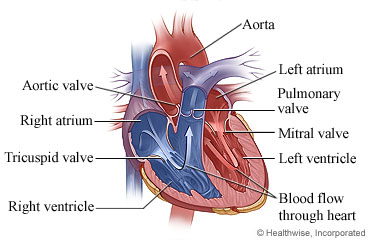
Overview
Bacterial endocarditis (say "en-doh-kar-DY-tus") is an infection of the heart valves and inner lining of the heart chambers. It is caused by bacteria that enter the bloodstream and settle on one or more of the heart valves. This infection can damage the valves and the heart. Endocarditis can be very serious.
Antibiotics are used to treat endocarditis. You may take antibiotics for several weeks. In some cases, surgery is done to replace a damaged valve. Now that you have had the infection, you are at risk for getting it again. It is important that you let all your other doctors know that you have had bacterial endocarditis. Let your dentist know too.
Follow-up care is a key part of your treatment and safety. Be sure to make and go to all appointments, and call your doctor if you are having problems. It's also a good idea to know your test results and keep a list of the medicines you take.
How can you care for yourself at home?
- If you are taking I.V. antibiotics at home with the help of a home health nurse, the nurse will teach you how to use the antibiotics and how to care for your I.V. catheter. Make sure you are comfortable using and caring for the I.V.
- If your doctor prescribed antibiotic pills, take them exactly as directed. Do not stop taking them just because you feel better. You need to take the full course of antibiotics.
- In the future, you may have to take antibiotics before certain medical, dental, or surgical procedures. Ask your doctor or dentist about this. Do not have any of these procedures without talking to your doctor or dentist first. Your doctor can give you a card to carry in your wallet which states that you need preventive antibiotics before certain procedures.
- Practice good oral hygiene. Brush and floss your teeth daily. Visit a dentist twice each year. Make sure your dentist knows that you have had endocarditis.
When should you call for help?
Call 911 anytime you think you may need emergency care. For example, call if:
- You have symptoms of sudden heart failure. These may include:
- Severe trouble breathing.
- A fast or irregular heartbeat.
- Coughing up pink, foamy mucus.
- You passed out.
- You have symptoms of a stroke. These may include:
- Sudden numbness, tingling, weakness, or loss of movement in your face, arm, or leg, especially on only one side of your body.
- Sudden vision changes.
- Sudden trouble speaking.
- Sudden confusion or trouble understanding simple statements.
- Sudden problems with walking or balance.
- A sudden, severe headache that is different from past headaches.
Call your doctor now or seek immediate medical care if:
- You have a new or higher fever.
Watch closely for changes in your health, and be sure to contact your doctor if:
- You have skin or nail changes.
- You do not get better as expected.
Where can you learn more?
Go to http://www.healthwise.net/patientEd
Enter A761 in the search box to learn more about "Bacterial Endocarditis: Care Instructions".
Current as of: October 2, 2025
Author: Ignite Healthwise, LLC Staff
Clinical Review Board
All Ignite Healthwise, LLC education is reviewed by a team that includes physicians, nurses, advanced practitioners, registered dieticians, and other healthcare professionals.

